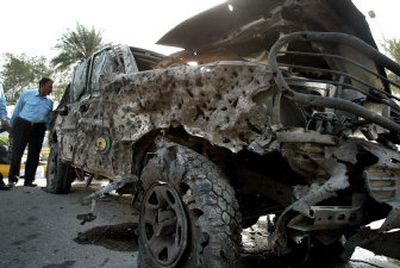Iraqis wary following attacks

BAGHDAD, Iraq – Police found at least 40 bodies – shot and discarded – in Baghdad in the previous 24 hours, the Interior Ministry said today, underscoring fears that deadly bombings in the capital Sunday night would ignite sectarian reprisal attacks.
The bodies were found in both Shiite and Sunni Muslim areas, many of them among Baghdad’s most dangerous neighborhoods, said Maj. Falah al-Mohammedawi of the Interior Ministry.
Scorched pavement, destroyed shops, burned out cars and four men shot in the head then hanged from electricity pylons – victims of revenge killings – awaited Shiite residents emerging from their homes Monday in Baghdad’s Sadr City slum.
Two car bombers and four mortar rounds shattered shops and market stalls at nightfall Sunday when residents were buying groceries for their evening meal. At least 58 people were killed and more than 200 wounded.
Despite the apparent revenge killings, Monday saw no major attacks. A key to that relative peace was anti-American cleric Muqtada al-Sadr’s refusal to be provoked. With thousands of his Mahdi Army militiamen ready to fight, the Shiite leader called for calm and national unity. It was the second time in less than three weeks that Iraqis stood at the precipice of civil war but pulled back.
Britain, the United States’ largest military partner in Iraq, showed its confidence Monday by announcing a 10 percent – about 800-troop – reduction by May.
Washington hopes to begin withdrawing some of its troops by this summer if a new Iraqi government is in place and judged sufficiently in control. But sectarian violence and political bickering has stalled the process.
Iraq’s new parliament will convene for the first time Thursday, three months after it was elected, to begin the process of forming the next government.
Bomb blasts and shootings in Baghdad and north of the capital, many of them targeting Iraqi police patrols, killed at least 15 people Monday and wounded more than 40. They included a U.S. soldier who died in a roadside bombing, the military said. A U.S. Marine was reported killed Sunday in insurgent-plagued Anbar province.
Police and Sheik Amer al-Husseini, a senior aide to al-Sadr, said the four men shot and hanged in Sadr City were captured by members of the cleric’s militia. Police said they cut the bodies down and took them to a hospital morgue Monday morning.
Iraqi police manned checkpoints Monday at main entrances to Sadr City, and armed militiamen fanned out inside the neighborhood. Many people ventured out only to buy food.
Under the watchful eye of armed militiamen, market vendors picked through the charred, twisted remains of their stalls to salvage what they could.
Abdel Karim al-Bahadli, 42, wept when he saw the devastation at the market close to his home. He blamed the extremist Sunni Takfiri sect of terrorist boss Abu Musab al-Zarqawi, leader of al-Qaida in Iraq.
“This is not resistance because there were no U.S. troops in the markets yesterday,” he said. “The Takfiris are only after Shiites. We will not be silent any more.”
Sadr City residents had feared an attack like this one after al-Sadr’s fighters stormed out of the slum to take revenge on Sunni Muslims and their mosques after the Feb. 22 bombing of a Shiite shrine in Samarra.
President Jalal Talabani said terrorists bent on civil war had taken advantage of a power vacuum caused by the delay in forming the government.